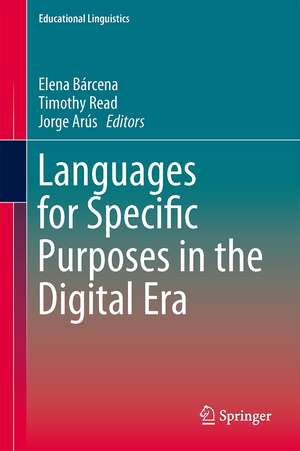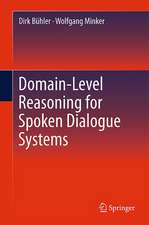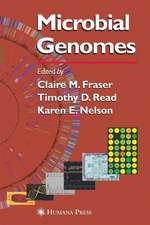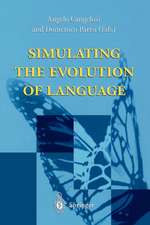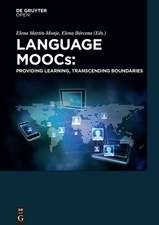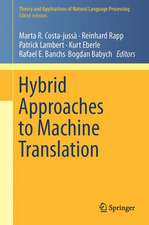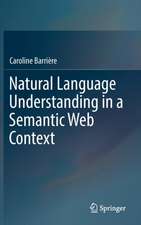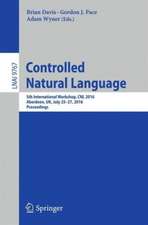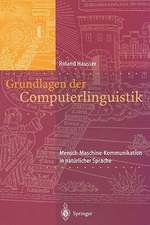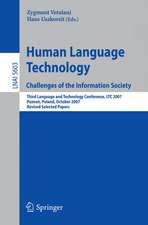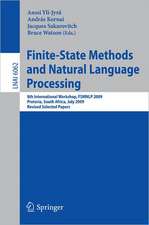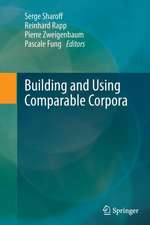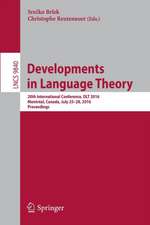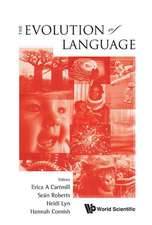Languages for Specific Purposes in the Digital Era: Educational Linguistics, cartea 19
Editat de Elena Bárcena, Timothy Read, Jorge Arúsen Limba Engleză Hardback – 18 dec 2013
| Toate formatele și edițiile | Preț | Express |
|---|---|---|
| Paperback (1) | 893.40 lei 6-8 săpt. | |
| Springer International Publishing – 3 sep 2016 | 893.40 lei 6-8 săpt. | |
| Hardback (1) | 899.52 lei 6-8 săpt. | |
| Springer International Publishing – 18 dec 2013 | 899.52 lei 6-8 săpt. |
Din seria Educational Linguistics
- 18%
 Preț: 959.98 lei
Preț: 959.98 lei - 15%
 Preț: 644.95 lei
Preț: 644.95 lei - 20%
 Preț: 495.48 lei
Preț: 495.48 lei - 18%
 Preț: 952.26 lei
Preț: 952.26 lei - 15%
 Preț: 649.87 lei
Preț: 649.87 lei - 18%
 Preț: 888.18 lei
Preț: 888.18 lei - 15%
 Preț: 644.95 lei
Preț: 644.95 lei - 15%
 Preț: 636.80 lei
Preț: 636.80 lei - 15%
 Preț: 634.49 lei
Preț: 634.49 lei - 20%
 Preț: 555.52 lei
Preț: 555.52 lei - 18%
 Preț: 940.72 lei
Preț: 940.72 lei - 20%
 Preț: 563.96 lei
Preț: 563.96 lei - 15%
 Preț: 638.57 lei
Preț: 638.57 lei - 20%
 Preț: 568.43 lei
Preț: 568.43 lei - 15%
 Preț: 642.83 lei
Preț: 642.83 lei - 15%
 Preț: 643.48 lei
Preț: 643.48 lei - 15%
 Preț: 638.76 lei
Preț: 638.76 lei - 15%
 Preț: 649.06 lei
Preț: 649.06 lei - 15%
 Preț: 643.65 lei
Preț: 643.65 lei -
 Preț: 390.08 lei
Preț: 390.08 lei - 15%
 Preț: 645.28 lei
Preț: 645.28 lei -
 Preț: 393.52 lei
Preț: 393.52 lei - 15%
 Preț: 649.39 lei
Preț: 649.39 lei -
 Preț: 392.75 lei
Preț: 392.75 lei - 18%
 Preț: 897.65 lei
Preț: 897.65 lei -
 Preț: 393.13 lei
Preț: 393.13 lei - 18%
 Preț: 728.28 lei
Preț: 728.28 lei - 15%
 Preț: 638.43 lei
Preț: 638.43 lei - 18%
 Preț: 1113.39 lei
Preț: 1113.39 lei
Preț: 899.52 lei
Preț vechi: 1096.98 lei
-18% Nou
Puncte Express: 1349
Preț estimativ în valută:
172.14€ • 178.63$ • 143.88£
172.14€ • 178.63$ • 143.88£
Carte tipărită la comandă
Livrare economică 15-29 martie
Preluare comenzi: 021 569.72.76
Specificații
ISBN-13: 9783319022215
ISBN-10: 3319022210
Pagini: 240
Ilustrații: XVII, 348 p. 100 illus., 86 illus. in color.
Dimensiuni: 155 x 235 x 27 mm
Greutate: 0.69 kg
Ediția:2014
Editura: Springer International Publishing
Colecția Springer
Seria Educational Linguistics
Locul publicării:Cham, Switzerland
ISBN-10: 3319022210
Pagini: 240
Ilustrații: XVII, 348 p. 100 illus., 86 illus. in color.
Dimensiuni: 155 x 235 x 27 mm
Greutate: 0.69 kg
Ediția:2014
Editura: Springer International Publishing
Colecția Springer
Seria Educational Linguistics
Locul publicării:Cham, Switzerland
Public țintă
ResearchCuprins
Preface.- Section 1: General issues about learning languages with computers. Information Technology and Languages for Specific Purposes in the EHEA: Options and Challenges for the knowledge society. Fostering Learner Autonomy in Technology-Enhanced ESP Courses. A blended learning proposal for professional English integrating Moodle with classroom work for the practice of oral skills. Student Assessment in the Online Language Learning Materials developed and delivered through the ingenio system.- Section 2: Computer-assisted experiences for the development of language competences and skills. Internet Dictionaries for Teaching and Learning Business English in Spanish Universities. Moodle Glossary Tasks for Teaching Legal English. Promoting Specialised Vocabulary Learning through Computer-Assisted Instruction. A Practical Application of Wikis for Learning Business English as Second Language.- Section 3: Corpus-based approaches to/ applications for teaching and processing languages. A Genre-Based Approach to the Teaching of Legal and Business English: the GENTT Specialized Corpus in the LSP Classroom. Innovative methods for LSP-teaching: how we use corpora to teach business Russian. Automatic specialized vs. non-specialized text differentiation: the usability of grammatical features in a Latin multilingual context. Exploring the Potential of Corpus Use in Translation Training: New Approaches for Incorporating Software in Danish Translation Course Design.- Section 4: Processing natural languages. Representing environmental knowledge in EcoLexicon. New approaches to audiovisual translation: the usefulness of corpus-based studies for the teaching of dubbing and subtitling. The pragmatic level of OntoLingAnnot’s ontologies and their use in pragmatic annotation for language teaching. Reflections on the future of technology-mediated LSP research and education.
Textul de pe ultima copertă
Explores the direct relation of modern CALL (Computer-Assisted Language Learning) to aspects of natural language processing for theoretical and practical applications, and worldwide demand for formal language education and training that focuses on restricted or specialized professional domains. Unique in its broad-based, state-of-the-art, coverage of current knowledge and research in the interrelated fields of computer-based learning and teaching and processing of specialized linguistic domains.
The articles in this book offer insights on or analyses of the current state and future directions of many recent key concepts regarding the application of computers to natural languages, such as: authenticity, personalization, normalization, evaluation. Other articles present fundamental research on major techniques, strategies and methodologies that are currently the focus of international language research projects, both of a theoretical and an applied nature.
The articles in this book offer insights on or analyses of the current state and future directions of many recent key concepts regarding the application of computers to natural languages, such as: authenticity, personalization, normalization, evaluation. Other articles present fundamental research on major techniques, strategies and methodologies that are currently the focus of international language research projects, both of a theoretical and an applied nature.
Caracteristici
Presents the state of the art of technological and methodological innovation in the teaching and processing of languages for specific purposes Theoretical analysis, fundamental research, and case studies on the current and future directions of technology-enhanced applied linguistics A high-ranking group of international researchers presents findings from significant publicly funded national and international research projects?
